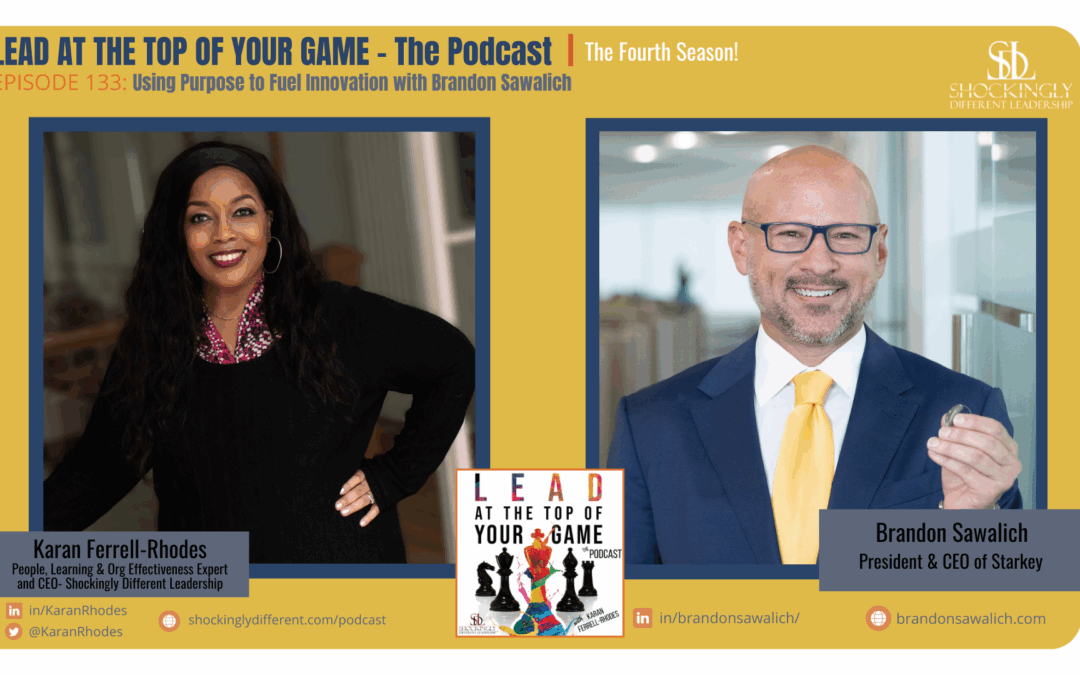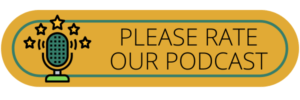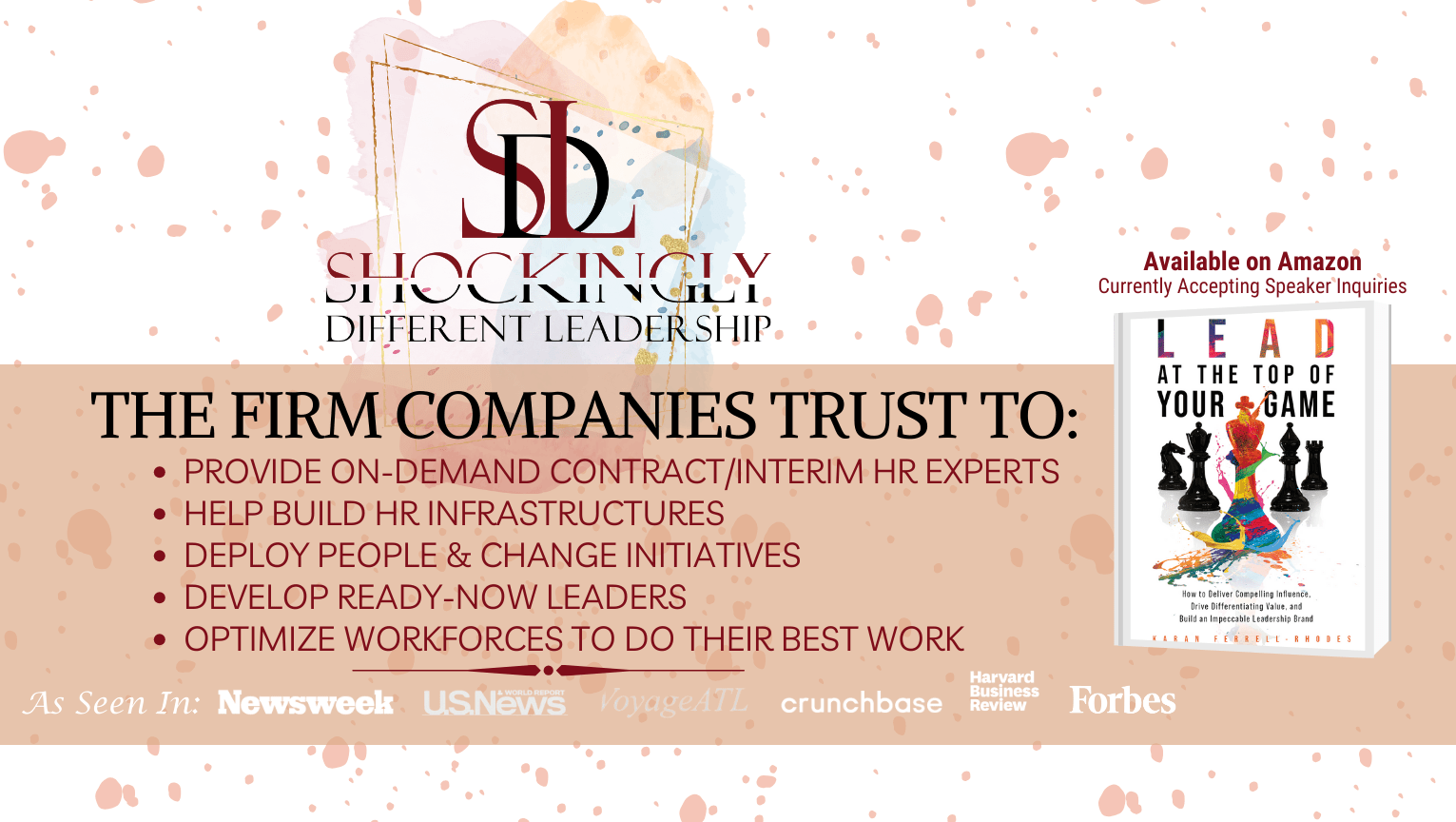IN THIS EPISODE, KARAN FERRELL-RHODES INTERVIEWS BRANDON SAWALICH
Brandon Sawalich, President and CEO of Starkey, discusses his 31-year journey at the company. He shares insights into his personal and professional journey, describing how he began as an intern and went on to lead the only American-owned hearing technology manufacturer. Brandon explores his leadership philosophy of servant leadership, building a strong, trust-based culture, and learning from both successes and failures.
Brandon Sawalich is the President and CEO of Starkey, a leading American-owned hearing technology manufacturer, employing over 5,000 people in 29 countries. Starkey’s products focus on making hearing aids more discreet and multi-purpose, addressing noise-induced hearing loss, and integrating AI for better sound processing. The company collaborates with tech giants like Apple and Samsung.
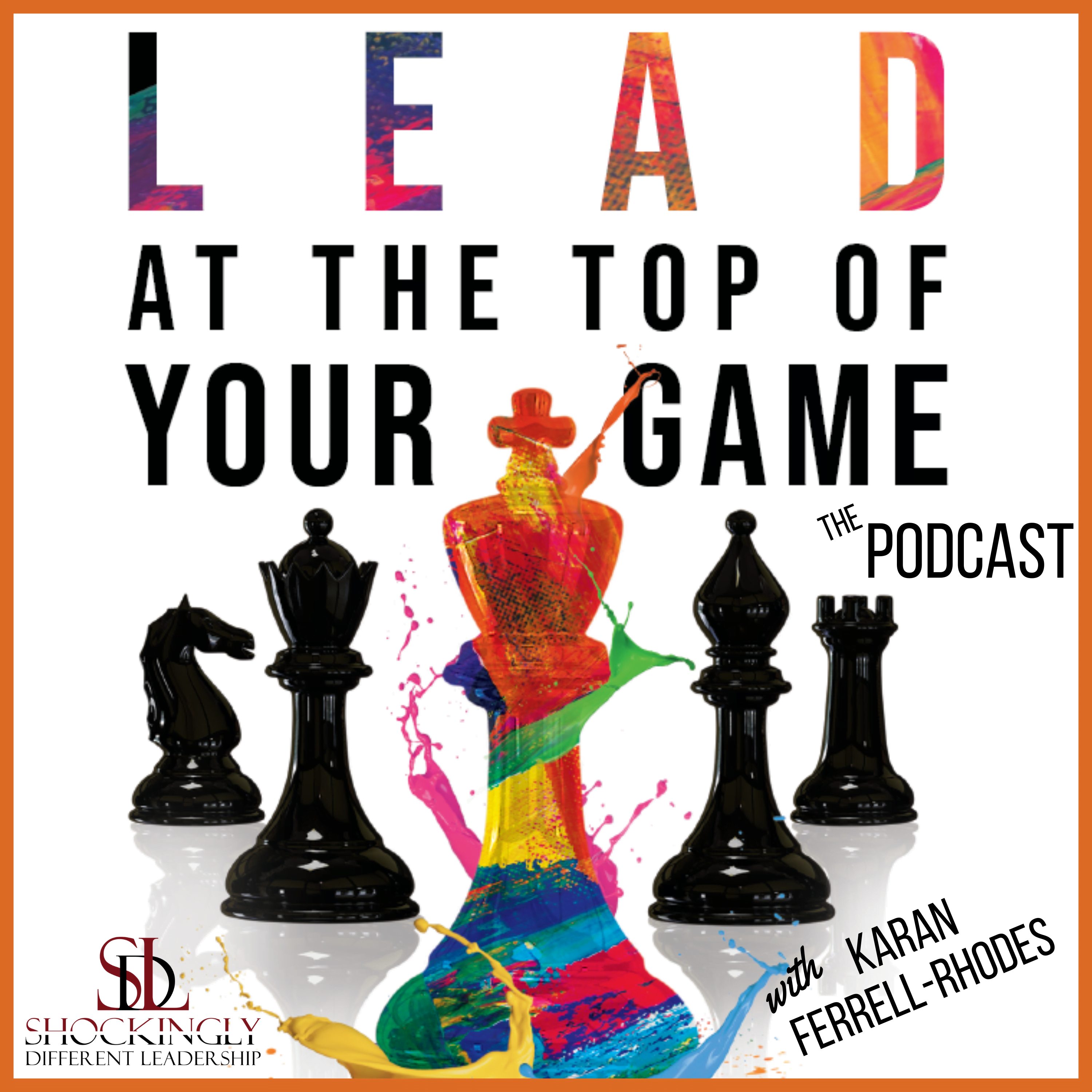
Posted by
SDL Media Team
Rather view our video podcast?

WHAT TO LISTEN FOR:
- Brandon Sawalich’s journey from intern to President and CEO of Starkey.
- The evolution of Starkey and its mission to create advanced, multipurpose hearing aids that enhance health and wellness.
- How Starkey is leveraging AI and technology to drive innovation in hearing protection and enhancement.
- Efforts to reduce the stigma around hearing aids through design and education.
- Starkey’s partnerships with major tech companies and their approach to serving clients.
- Brandon’s leadership philosophy, including servant leadership and building a strong, trust-based company culture.
- Advice for finding personal purpose, embracing change, and taking initiative in one’s career.
- Brandon’s reflections on company pride, employee culture, and the impact of their work.
“We have to hire for attitude and develop the talent.”
FEATURED TIMESTAMPS:
[01:50] Brandon introduces himself and shares about his recent marriage, family, and personal life.
[03:46] Brandon describes his career journey at Starkey, starting as an intern and rising to CEO.
[04:51] Discussion of Starkey’s growth in employee numbers and company resilience.
[06:29] Overview of Starkey’s mission, evolution, and focus on innovative hearing technology.
[07:59] Explanation of Starkey’s target audiences and how their products reach consumers.
[10:41] Brandon discusses technological innovation, including AI, hearing protection, and health features.
[14:29] Partnerships with major tech companies and Starkey’s role in custom ear molds for various industries.
[16:33] Brandon’s leadership philosophy: leading from the front, servant leadership, and company culture.
[18:20] Signature Segment: Brandon’s entry into the LATTOYG Playbook: The importance of building an executive team, setting a clear vision, and developing a strong “feeder system” for leadership.
[19:36] Learning from mistakes, encouraging risk-taking, and fostering direct communication.
[23:01] Advice for listeners on finding purpose, being patient, and taking initiative.
[26:13] Signature Segment: Brandon’s LATTOYG Tactic of Choice: Leading with Courageous Agility
[28:15] Brandon’s proudest leadership win: seeing employee pride and company culture thrive.

ABOUT BRANDON SAWALICH
Brandon Sawalich is the President and CEO of Eden Prairie-based Starkey, the only American-owned hearing technology manufacturer. Brandon has worked in the hearing industry and at Starkey for over 30 years. Throughout his tenure, he has advanced through the ranks from Starkey’s hearing aid repair department to President and CEO. He leads a global team of more than 5,000 employees with facilities in 29 countries.
Brandon’s vision of hearing aids becoming high-tech health devices has led Starkey to be a leader in innovation, developing cutting-edge products and solutions to help people hear better and live better.
LINKS FOR BRANDON:
- Website: https://brandonsawalich.com/
- Company Website/Edge AI Hearing Aids – https://www.starkey.com/hearing-aids/edge-artificial-intelligence-hearing-aids
- LinkedIn: https://www.linkedin.com/in/brandonsawalich/
- Facebook: https://www.facebook.com/brandonsawalichstarkey/
- Instagram: https://www.instagram.com/brandonsawalich/?hl=en
- X: https://x.com/BrandonSawalich
ADDITIONAL RESOURCES FOR YOU:


Episode Sponsor
SDL is the go-to firm companies trust when needing to:
- supplement their in-house HR teams with contract or interim HR experts
- implement leadership development programs that demonstrate an immediate ROI and impact on the business

Episode 133 | Using Purpose to Fuel Innovation with Brandon Sawalich
Brandon Sawalich 00:03
It takes that passion, but also resilience. And you know, for me, there’s a lot of there was always, always dots, but then they started to connect, and it’s taken the initiative. And I was always willing to take initiative and do whatever it was and learn the company. And there were times that I had, you know, you always like, Oh, should I be here? Maybe I should be, you know, go get experience at this company or here. And I never wavered, you know, maybe for an evening or a day, but it always came back to Starkey.
Voiceover 00:03
Welcome to the lead at the top of your game podcast where we equipped you to more effectively lead your seat at any employer, business or industry in which you choose to play. Each week, we help you sharpen your leadership acumen by cracking open the playbooks of dynamic leaders who are doing big things in their professional endeavors. And now your host leadership tactics and organizational development expert, Karan Farrell Rhodes.
Karan Rhodes 00:36
Hello, my superstars. This is Karen, and welcome to another episode of the lead at the top of your game podcast. We’re absolutely over the moon to have on today’s show. Brandon Sawalich. Hope I said that, right. Sawalich, he is the president and CEO of Starkey, and Starkey is the only American owned hearing technology manufacturer, believe it or not, Brandon has worked in the hearing industry, and it started for over 30 years, which is kind of rare these days, people kind of jump companies and industries, but if you want to talk about a true leader that has in depth knowledge about a particular industry, brand is our guy. He now leads a global team of more than 5000 employees with facilities in over 29 countries. So welcome to the podcast. Brandon,
Brandon Sawalich 01:26
Thank you, Karan, thank you for having me.
Karan Rhodes 01:29
Oh, I’m super thrilled to have you. Can’t wait to hear more about the fantastic products and work that Starkey is doing and how they’re serving their clients. But before we do that, we always love to know just a little bit more about our guests. So for just as much as you feel comfortable, can you give us a sneak peek into your life outside of work?
Brandon Sawalich 01:50
I’d be happy to it’s something I rarely do, because I’m talking about Starkey so much. It’s something talking about myself is, you know, I go there every once in a while, but I recently got married, so
Karan Rhodes 02:02
Oh, congratulations
Brandon Sawalich 02:03
One month ago, Jessica and we have four kids. And my daughter Amelia, lives in North Carolina. My son William races XFINITY NASCAR for Joe Gibbs racing. And then our other two boys, Jackson and Christian, are interning here at Starkey as they’re off from college break over the summer. So life’s busy outside of work.
Karan Rhodes 02:33
It sounds like it. It sounds like it, but it sounds like a very full family with a lot of activities. So I’m sure all the kids and your new wife keep you busy. Just returned from the honeymoon. So well, wonderful. Can you just share where you went for honeymoon for us?
Brandon Sawalich 02:52
We went to Ireland, never been there, and then to Santorini and Monaco. So three unique destination trips over two weeks. So already it was great. Everybody asks you, what was your favorite spot, and each one, because they’re all so different. Yeah, we’re ready and back at work.
Karan Rhodes 03:12
Well, I can understand. Well, good that you took the time off, enjoyed your honeymoon. And you know what? Starkey didn’t burn down, because I know you set them up for great success while you were gone. And congratulations once again, and thanks so much for sharing that. Thank you. Alright, well, let’s turn to you your story and Starkey, and I’d love to start out by understanding maybe a couple of professional highlights in your career, and then how you ended up becoming president and CEO Starkey.
Brandon Sawalich 03:46
Well, I you know, there’s always doors that open, windows closed. We know, you know, we know those phrases Absolutely. I started at Starkey 31 years ago this month, and it was a summer intern job, and I took a just finished my first year of college, was going to go back to my second year. And I enjoyed what I was doing in the internship, and there was an opportunity, and I liked the responsibility. I stayed. I said, I’ll start in January. Well, 31 skip, years later, here I am, and you know, it’s really what I’ve learned. There’s moments in a career, and they’re not always successes. They’re failures too, because that’s where you learn the most, and then having good mentors and people around you that help you through those moments and how to grow on how to grow the successes. And for me, it’s about the team you know, having the right team.
Karan Rhodes 04:42
No, it sounds like it when you started at Starkey, approximately how many employees were there at the time. Thumb in the wind?
Brandon Sawalich 04:51
We were one, it was one probably, uh, I would say when I started, there were 1500… 1500 around the world. Here on campus, there’s 1400 now and back then, there’s, you know, less than 800
Karan Rhodes 05:09
Wow, that’s amazing. The growth that you have had over the years and and the longevity, because it’s really hard for companies, you know, throughout, you know, technology changes at a nanosecond. Yes, industries change also very quickly. And for you all to have been a leader and continue to be a leader, even you know, this long into the company, is just amazing.
Brandon Sawalich 05:35
It takes that passion, but also resilience. And you know, for me, there’s a lot of there was always, always dots, but then they started to connect, and it’s taken the initiative. And I was always willing to take initiative and do whatever it was and learn the company. And there were times that I had, you know, you always like, Oh, should I be here? Maybe I should be, you know, go get experience at this company or here. And I never wavered, you know, maybe for an evening or a day, but it always came back to Starkey.
Karan Rhodes 06:08
Well, I can understand too, based on the values and the work you’re doing once if you love it, you know, why? Why change absolutely now, no, I did not do Starkey justice in the interest. So would you share with our listeners a little bit more about what Starkey does and who they serve, and a little bit more about your hearing technology?
Brandon Sawalich 06:29
Absolutely. So Starkey was founded in 1967 and today, you know, we’ve evolved, and we’re hearing technology company. So you know what we’re doing with hearing aids and hearing technology. We’re making them cool. It’s, you know, the stigma around hearing aids is still that of 2030, years ago. And you know, my focus and vision for the company is having the best hearing aid in the in the world, and making it more of a personal assistant than a hearing aid, more multi purpose than the single purpose. Because people get hearing aids, they want to hear better, so we have to have the best sound. And then we’re also working on products that protect and improve healthy hearing. So stop the hearing loss of the noise upfront, right? Because one in six teenagers have a hearing loss right now.
Karan Rhodes 07:25
with all the ear pieces we have in our ears and blasting music or whatever they’re watching,
Brandon Sawalich 07:30
So we’re all about the ear. I mean, Starkey, we focus on, how can we help people be the best they could be each and every day, either through protecting their hearing or with our hearing technology for hearing aids,
Karan Rhodes 07:42
Amazing. So I’m curious about who are your target audiences? Do you do direct to consumer, or do you mostly work with doctors that specialize in, you know, assisting those with hearing issues?
Brandon Sawalich 07:59
So for our sound gear products, which is our hearing protection that’s more direct to consumer, for a hearing aid and our hearing technology, those are we serve the hearing healthcare professional and doctors and audiologists that then provide our products to their patients, so somebody that comes In with a hearing loss gets a hearing test evaluation, and then they prescribe the product from Starkey that’s best fit for their lifestyle and their need. We have about, let’s say, you know, our universe here in the US is around 5000 hearing healthcare professionals that we work with.
Karan Rhodes 08:41
And I really love how your focus, not only on those that have hearing challenges, but also hearing protection, being very proactive, and you’re right, there is such as stigma out there, unspoken stigma, in Many cases out there, around those that have hearing challenges. But are you seeing it getting better, and are being more accepting of it, or being a less of a stigma? Or do we still have a ways to go?
Brandon Sawalich 09:14
We still have a little bit of ways to go, but because of our product, you know, there’s, there’s five hearing technology companies in the world. Starkey is the only US owned and operated here in Minneapolis. And you know what we’ve been doing with our product line, making them more multi purpose and and the sleek design and the and the features and the patient ease and use of our products for the with through the professional, it’s the education of that. It’s not your, you know, great grandpa’s hearing aids anymore, right? Is in the movies, in the media, or, you know, I still see today, to nobody’s fault, because they don’t know either. Is pictures of, you know, these, the big hearing aid behind your ear. And. From 1980s Yeah, and that’s not today’s technology. I mean, barely see them. Wouldn’t even know it if you were wearing one. And really it’s kind of making it again, the hearing aid, more of your personal assistant. That’s where we’re going.
Karan Rhodes 10:15
I love how the how you couch that and what has been, kind of the feedback from your clients on that? Are there any additional special requests that they would love to see you all do in the future? I mean, it sounds like you have a great product for today, in today’s world, but where do you see the evolution of hearing technology going?
Brandon Sawalich 10:41
I see for hearing protection. It’s going to continue what we’re doing with AI and being able to identify surroundings. You know, we’re working with the act the DoD on for our active military men and women that, you know, they could they’re not putting cotton balls or foamies in their ear. They’re devices that they could hear and have such situational awareness. And as soon as there’s a loud noise, it cuts it out, protects them. And then, for the, you know, those that have hearing loss, it could be a mild hearing loss or profound. You know, it’s always about the sound processing and what we could do with AI. And really our products, through our technology, is exercising the brain, and it’s filling in the dots or the holes that might have come from those with hearing loss. So we got to keep the brain active and really starting to position the product as a health and wellness product, and it’s not just a hearing aid that amplifies sound. You know, we have fall detection as one of our health features, where, if somebody, you know, depending on their age and what they need, if a fall is detected, it can text you or two other your family members that your mom or dad or somebody, as you know, the hearing aids detected a fall.
Karan Rhodes 12:04
I didn’t realize technology was so advanced that it can be able to do that.
Brandon Sawalich 12:07
Well, thanks to Starkey, we’re the only ones that, yes, we can do that. And that’s where we’re focused. Is you asked about kind of where we’re going. Think of it like I always say this because my my son growing up, you know, I’ve seen all the 22 Marvel movies, wig of like Jarvis in your ear from Iron Man. Ah, yes, that’s where, you know what I see, because the ears the you know the best, one of the best places for that assistance, the health detection, along with, you know, as I said earlier, exercising the brain and keeping somebody active.
Karan Rhodes 12:48
Are there industries that you’re not targeted in yet that you would love to, that you can say, because I don’t want to give away any IP or anything that you’re trying to, you know, strategy they want others to hear but I can imagine it. There’s so many opportunities based on how the advancement of technology that you all have created
Brandon Sawalich 13:09
There is and you know, really the industries is the population. You’ve got 450 million people in the world that have hearing loss. 44 million here in the US. What about those that don’t? What if they can everybody, you know, we talk sports a little bit you and I did before he came on. And yeah, and what if you know your job, profession, career, pickup game of basketball, football, whatever it might be. What if your product can make you just a little bit better? Give you a superpower, give you a little bit better, more than normal hearing, and along with us, some other health features and monitors. So the opportunities there, the technology is really our barrier, because we could go so only so fast as technology continues to evolve for the good. So it’s really using your ear for you don’t have to have a hearing loss. You could protect your hearing. But you know, everybody wants you know their superpower, using that as a an advantage in your daily job.
Karan Rhodes 14:10
Yeah, definitely. Do you all have other and it’s okay if the answer is no, I’m just curious. Do you all have other partners that you work with, like in a joint venture space, to help with overall?
Brandon Sawalich 14:29
not in joint venture, but we have partners in technology, our hearing aids, Bluetooth, they stream. So we work with Apple quite a bit. And Samsung, we’ve worked with Google, so a lot of the top names, and then some, you know, smaller companies that are really focused on sound processing, and you know, the best, cleanest sound and working on micro processors that we work with for our. Next generation of products
Karan Rhodes 15:02
That makes a lot of sense, you know, where I was thinking one that popped in my head, you know, because I’m a notorious brainstormer, I was thinking, Well, I wonder, when you said hearing protection, I think about, and we still have them, you know, call centers, or people that are customer service reps that have those, you know, headsets, and if you had the protection technology in the ears that, you know, for an employee’s well being.
Brandon Sawalich 15:27
It’s funny, you said that’s been Starkey was, was in that business. We still are, because we provide ear molds, custom ear molds, or, you know, call centers operators, whoever, first responders, TV personalities and news anchors who have earpiece in their ear. So we do a lot of customized molds, but also using our technology so they can hear what’s coming in a lot clearer.
Karan Rhodes 15:55
That’s amazing. Well, Brandon, I’d love to pivot a little bit and talk about you as a leader, if we can to put you on the hot seat a bit, because, you know, being with a company that’s experienced such great growth, but in a niche industry, I’m sure there are, you know, tons of leadership opportunities and challenges that come across your plate daily. And so, you know, with Starkey being a purpose driven company, what is your personal approach to leading and being at the helm of such a company?
Brandon Sawalich 16:33
I appreciate that question, because I get asked a lot of leadership. You know, there’s a lot of definitions of leadership. And me, you know, the way I look at my role in leadership. I I always have had this. My internal motto is leading from the front. I’m not going to ask anybody to do anything that I wouldn’t be willing to do. And yes, my title is President and CEO. And you know, you could look at org charts, but in my mind, I flip it, because I work for the people of Starkey, it’s my job to be looking up and out and making sure we’re focused and they have the resources so they’re successful. The company is successful. Our customers are patients, so I’m, you know, that servant, I guess, leadership, but also the strategic and visionary where I have to be thinking about next year and two years out, because I know the industry, know the patient and, you know, I don’t have to do everything inside the company. You know, I don’t know how to. I grew up playing the saxophone for five, six years in grade school. I don’t know. I don’t need to know how to play a clarinet or flute. I’m the conductor,
Karan Rhodes 17:43
Right?
Brandon Sawalich 17:43
For Starkey. So I bring the team together because it’s about the people you’re only going to go as far and as great as the teams that you build and the type of people you bring in with an established culture that we have here at Starkey.
Karan Rhodes 17:58
I yeah, you’re so right. I love that. And as you said when you talk about it, it was I’m sure do you do when you have your town halls or to your entire team about what you all are trying to achieve and in the way you’re trying to achieve it, then it really gives a roadmap for your organization on how they can best contribute and be on board and evangelize the culture that you’re trying to create there. And that’s important for leaders of all types and
Brandon Sawalich 18:29
And here at Starkey, you know the the team building and the people you know, the new hires and people that we bring in and and develop, we do focus it around our culture, and it starts with caring. In our industry, we’re in the caring business. We’re in the people business, because we help connect people with people through better hearing, yeah, and you know, we have to, as I, you know, say is, you know, we have to hire, you know, hire for attitude, develop, you know, the talent, because it’s very hard to develop a bad attitude.
Karan Rhodes 19:03
That’s true. That’s definitely true. You know, being in that role for so long, I’m sure there were some roadblocks or hiccups along the way, and I’m curious about how, what is your approach to learn from those challenges, or maybe any potential? I won’t call them mistakes, but, things that happen…
Brandon Sawalich 19:36
You have to make mistakes. You have to fail. And that’s what I even talked to you know my son about and others in life, that’s how you get better, right? And you know, for me is, you know if you’re going to fail, fail fast and move on. Yeah, you know you can take risks. If something works great, if it doesn’t know, when you know it’s not, it’s time to. To, to move, move on from it, you know, as a leader of the company, it’s, it’s really, you know, for me, it’s about working with the people directly. And it’s kind of, this is how we are structured and how we work internally. We don’t need a lot of committees. We don’t have to wait for a board meeting or all this if it’s the right thing to do. And if we can help somebody just, you know, a little bit better, and get this feature in or something, we go and have direct conversations. We have candid conversations. You know, there’s no, you know, ladder climbing and all the, you know, the bureaucracy that comes in some other companies, it’s really, again, it goes back to the people, and that’s what’s helped me learn from different people, but also bring Starkey to where it is, is the talent that we have in the attitudes.
Karan Rhodes 20:53
But I can tell you’re very personable and hands on leader, but when you grow your team to be in the 1000s, you know, how do you get that to permeate throughout that’s in our organization.
Brandon Sawalich 21:07
That’s a good you know, for me, you know, 10 years ago, really starting with building an executive team, and then, you know, you you’ve got to have the feeder system right, and you’ve got to get set the vision to be clear what type of, you know, the culture, and really getting that culture, I’ll say, permeate the organizations, but jump start, because it’s there. But, you know, sometimes it goes down, yeah, yeah. And then clear with a vision. And then I’ve made mistakes on hires. I’ve made mistakes on promotions, you know, and I’ve learned from those. And then you start dialing it into it comes down to you have a strong bench. And I see this and hear this in conversations with friends and other CEOs and executives that I know, where you know they’re going to go get this star person at XYZ company, well, because they’ve got the skill set, but what I’ve learned is, number one, the culture and the trust. And just because they might not have 20% of what you need, but if they have 80% of what you need for that role, develop the 20% because Trust is everything. If you can have a conversation and know what you’re asking and what you’re hearing, you can is truthful, and you depend on that person. It’s it’s everything,
Karan Rhodes 22:33
Love that, love that. Now we always try to give our listeners. You know, although you’ve been giving us value bombs during the entire episode, but we always love to give them a few additional nuggets if they don’t remember anything else from your advice or your leadership journey, what do you want to make sure that our listeners take away from this Episode in your leadership approach,
Brandon Sawalich 23:01
Find your purpose and your definition of leadership, because everybody has a different definition, and that’s okay. And you know, if you find a place or a passion, you’re never going to work a day of your life. That’s true, and you have to lead yourself before you could lead others and really understand who you are as a leader and be comfortable with that. Don’t try and be somebody you’re not.
Karan Rhodes 23:28
Absolutely. You know, I talked to a lot of those that are early in career, and they’re struggling because they don’t understand, or are clueless, or think they’re clueless about what their purpose is so is there any advice that you kind of share with your, you know, sons and daughters, about how to find your purpose?
Brandon Sawalich 23:51
Be patient. There’s so much pressure because of social media or conversations and instant information. You know, I found myself with, you know, my daughter graduated college last year, like, Oh, what are you going to do? You know, you figure out what you’re going to do, and that’s, that’s just the, you know, the basic questions we’ve asked our whole lives. But just take your time, because it’s okay to have some bridges, but short bridges to go try something, and then go get on another bridge, and then you’re going to find it. The point is, don’t rush for the corner office. Don’t rush for the office. Stay connected. Learn and be resourceful and take initiative. Take initiative because it’s hard work.
Karan Rhodes 24:34
It is hard work, and the worst thing you can do is get stuck into something that you you know, spend a lot of time, and get stuff that you don’t have passion about. That’s when passion about. And that’s when it feels like quicksand, Go into work, right?
Brandon Sawalich 24:45
And have the courage to you know, if you’re quicksand and you just know it, speak up and go do something you want to do. Get out it is? Life’s too short.
Karan Rhodes 24:57
Get out of it. It is. It totally, is. Well speaking of courage. You know, we always love to ask our guests which of the leadership execution tactics that came out of our research really popped for them and for my newer listeners. You may not know that our company did research on high performing leaders and organizations, and we tried to understand, what do they do that was so different than 99% of the other population? And we came out of seven buckets. We discovered, I’m sorry, seven buckets of we call them tactics, but they’re activities that are always done by those who are at a high performing level. Now, all seven are equally as important. You just use them at different times in different ways, but Brendan was Brandon, I’m sorry, was so kind to share that courageous agility was the one that really resonated with them. With him, I’m sorry, and courageous agility is all about having the courage and the fortitude to still move forward and take calculated risk, even if you’re uncertain of what’s going to happen in the future. So curious minds would love to know Miranda, why courageous agility really popped for you.
Brandon Sawalich 26:13
Well, change can be a word that people are fearful of, but every day is change. It is, you know, everything changes, and that’s how you grow. That’s how you develop. And for a company, if you’re going to step up, you know, our industry has always done incremental improvements to the products. Well, you know, I wanted to do something different and take a swing and a moonshot, per se, and bring in AI, which we were the first company to do that in our industry in 2018 with the product, and then expand the hearing aid from a single purpose to multi purpose. So you have to take risks if you’re going to change people’s lives and stand out in the world. Absolutely, that’s okay to fail. Just get up and keep going forward. Don’t give up.
Karan Rhodes 27:02
Don’t give up. I love that absolutely. Well, of course, Brandon, we’re gonna have your bio and information and links all in the show notes, but I always love to give our guests some air time to also understand, let our listeners know where to find you and to learn more about the company. So would you mind I’m sharing where they can find you or look more look up more about Starkey?
Brandon Sawalich 27:28
Yeah, obviously starkey.com and you know, for me, Brandon saw it, S, A, W, A, L, I, C, H, not too many handles like that or on X or anywhere else. So please feel free to follow me, because I’m always sharing leadership insight and what’s going on in the world of AI and hearing technology.
Karan Rhodes 27:50
Oh, that’s wonderful if I can sneak in one last question, because usually this is the final one, but I always, sometimes we have time to sneak in one last question. I’m just curious, what is one big leadership win that you have experienced over your career that you’re so proud of
Brandon Sawalich 28:15
Seeing the faces and feeling the celebration of the employees and how proud they are to work at Starkey, where we’re at now, because we had to go through a lot to get where we are, and companies do, but when I can see the smiles and people know and feel that we’re winning, you know, that’s, that’s why I’m in it. I mean, it’s really, it’s not about the bank accounts are, you know, all all about market share. You could sell cheap product and bad product for market share. It’s knowing that you’re providing great technology, great products. You got a great company, great people, great culture, and our customers are telling us that we’re doing a good job.
Karan Rhodes 28:59
That is a huge win, yeah, and that’s what keeps it going, keeps and that’s why you’ve been Starkey has been here for, what, over 30 years now. It’s been amazing, amazing road and journey that you all have. And I just want to personally congratulate you on, you all on that you and your entire organization. I know it takes a full team.
Brandon Sawalich 29:18
Yes, it does.
Karan Rhodes 29:19
Oh, well, thanks again. Brandon for the gift of your time, tons of knowledge you shared with us today. Thank you for letting us to feature Starkey, and I’m hoping our listeners will check you all out. I know there are folks with needs out there. We don’t talk about it a lot, but we’ve tried to bring resources and companies that are doing big things to the podcast, and you definitely fit the bill
Brandon Sawalich 29:44
Well. Thank you. I appreciate being on and love to come on again anytime and talk more leadership and whatever else you might want to talk about.
Karan Rhodes 29:50
Okay, that sounds like a vet. I wanted to reach back out to your team and get you all right. And thank you to listeners for the gift of your time. As well, because, as I always say, we know there are millions of other podcasts you could be listening to, and we do not take your patronage lightly at all. All that we ask is that you like and subscribe on your favorite platform of choice and share our podcast with just one friend, because by doing so will help us all to better lead at the top of our games. Thank you so much, and see you next week. And that’s our show for today. Thank you for listening to the lead at the top of your game podcast, where we help you lead your seat at any employer, business, or industry in which you choose to play. You can check out the show notes, additional episodes, and bonus resources, and also submit guest recommendations on our website at leadyourgamepodcast.com. You can follow me on Twitter, Facebook, Instagram, and LinkedIn by searching for the name Karan Rhodes with Karan being spelled K a r a n. And if you like the show, the greatest gift you can give would be to subscribe and leave a rating on your podcast platform of choice. This podcast has been a production of Shockingly Different Leadership, a global consultancy which helps organizations execute their people, talent development, and organizational effectiveness initiatives on an on-demand, project, or contract basis. Huge thanks to our production and editing team for a job well done. Goodbye for now.
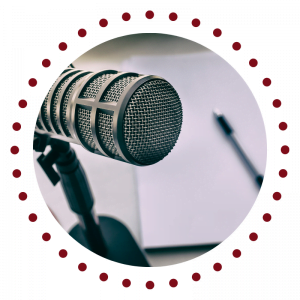
Want to be a Podcast Guest?
Check out our guest qualifications and submit our brief form to be considered.
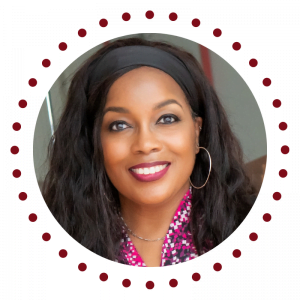
Want Karan to be Your Podcast Guest?
- Blended Workforces & the Gig Economy
- Critical Execution Tactics of High-performing Leaders
- Entrepreneurism & Leading Your Business
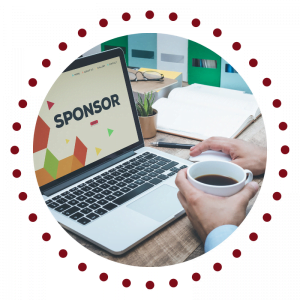
Want to be a Podcast Sponsor?
All sponsorships come with a featured spot on show notes pages.
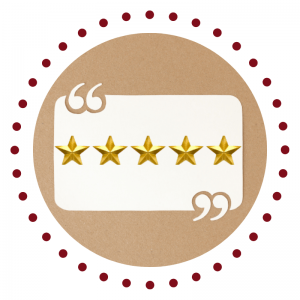
Like the Show? Please Leave a Review
If you like the show, it would mean the world to her if you left a quick review.
Your word is golden, so a HUGE thank you in advance!

#KeepInTouch
via our podcast alerts
Subscribe now to discover why thousands of monthly listeners who are passionate about doing their best work prioritize time each week to listen to the Blended Workforces @Work podcast.
#AboutSDL
#WhereToFindUs
MAILING
4480-H South Cobb Drive
PMB 219
Smyrna, GA 30080
PHYSICAL
2121 NewMarket Parkway
Ste. 108
Marietta, GA 30067
#ContactOptions
Customer Service Email:
service@shockinglydifferent.com
Call or Text:
770-384-1103
#Office Hours
MON-FRI
8:30 AM – 6:30 PM
Weekends By Appointment

